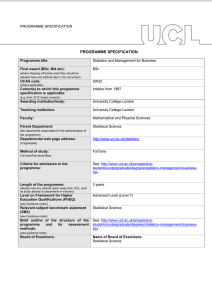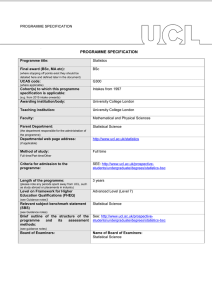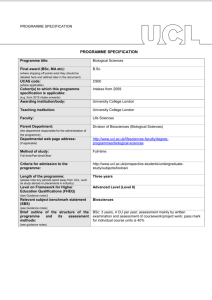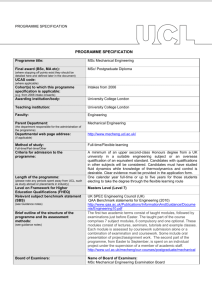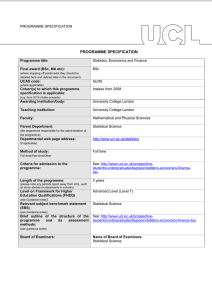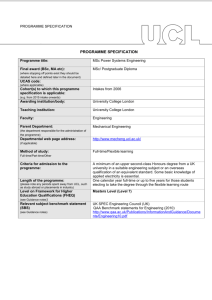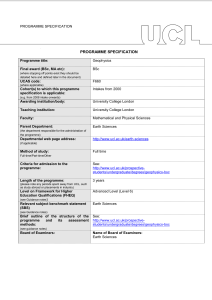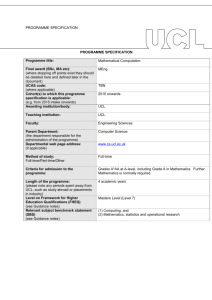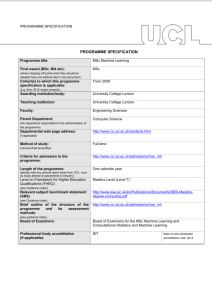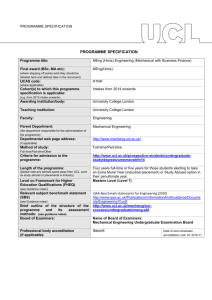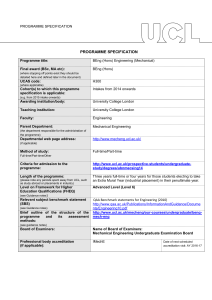BSc Genetics - University College London
advertisement
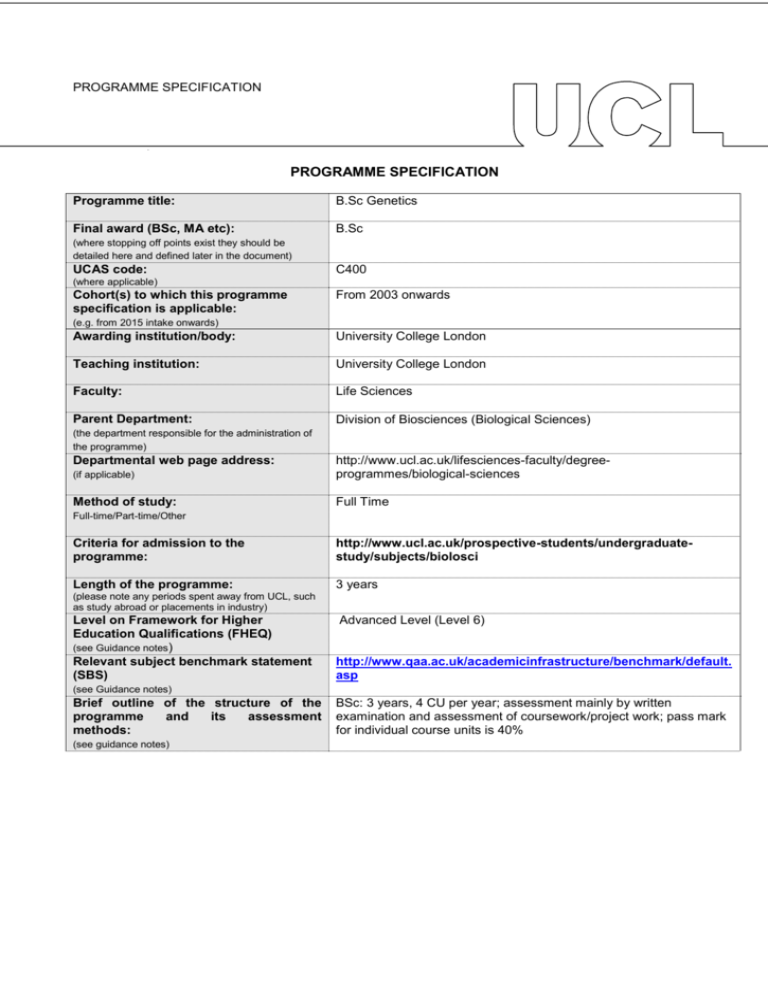
PROGRAMME SPECIFICATION PROGRAMME SPECIFICATION Programme title: B.Sc Genetics Final award (BSc, MA etc): B.Sc (where stopping off points exist they should be detailed here and defined later in the document) UCAS code: C400 (where applicable) Cohort(s) to which this programme specification is applicable: From 2003 onwards (e.g. from 2015 intake onwards) Awarding institution/body: University College London Teaching institution: University College London Faculty: Life Sciences Parent Department: Division of Biosciences (Biological Sciences) (the department responsible for the administration of the programme) Departmental web page address: (if applicable) http://www.ucl.ac.uk/lifesciences-faculty/degreeprogrammes/biological-sciences Method of study: Full Time Full-time/Part-time/Other Criteria for admission to the programme: http://www.ucl.ac.uk/prospective-students/undergraduatestudy/subjects/biolosci Length of the programme: 3 years (please note any periods spent away from UCL, such as study abroad or placements in industry) Level on Framework for Higher Education Qualifications (FHEQ) (see Guidance notes) Relevant subject benchmark statement (SBS) Advanced Level (Level 6) http://www.qaa.ac.uk/academicinfrastructure/benchmark/default. asp (see Guidance notes) Brief outline of the structure of the programme and its assessment methods: (see guidance notes) BSc: 3 years, 4 CU per year; assessment mainly by written examination and assessment of coursework/project work; pass mark for individual course units is 40% Board of Examiners: Name of Board of Examiners: Biological Sciences Professional body accreditation (if applicable): Date of next scheduled accreditation visit: EDUCATIONAL AIMS OF THE PROGRAMME: To provide students with an education in a wide range of areas of genetics, including such topics as population and ecological genetics, evolutionary theory, developmental and molecular genetics, human genetics, genome projects. To foster an understanding of the scientific approach to problem solving. PROGRAMME OUTCOMES: The programme provides opportunities for students to develop and demonstrate knowledge and understanding, qualities, skills and other attributes in the following areas: A: Knowledge and understanding Knowledge and understanding of: 1. 2. 3. 4. Concepts of genetics. The genetic basis of evolution. Current research in genetics. The impact of genetic research on society. 5. Scientific approaches to research problems. Teaching/learning methods and strategies: Acquisition of knowledge through one-hour lectures and associated small group tutorials, practical classes, library work and preparation of coursework. In addition to attendance at lectures and tutorials, students are required to study independently. The optional field course is an intensive ten days of field work, laboratory study and data analysis. Much of the teaching/learning in year 3 is by one to one project supervision. At this level, students are expected to carry out a great deal of independent learning, bringing any problems to appropriate staff for assistance. Lectures in third year courses are usually by subject specialists and are intended to open the topics for further independent study. Many courses contain opportunities for presentation or debate in addition to the more conventional tutorials and problem solving classes. Assessment: Students are assessed by a variety of methods, but primarily by “unseen” examinations, coursework (which may include essays, problem solving, debate, group presentation), a project report and an oral presentation. Overall understanding is assessed in oral examination. B: Skills and other attributes Intellectual (thinking) skills: 1. Reason critically. 2. Apply genetic knowledge in a variety of different situations especially in the formulation and testing of scientific hypotheses. 3. Identify and solve problems; 4. Analyse and interpret numerical and molecular data. 5. Demonstrate and exercise independence of mind and thought. Teaching/learning methods and strategies: Intellectual skills are developed through the teaching and learning programme outlined above. Each course, whatever the format of the teaching, involves discussion of key issues, practice in applying concepts to problemsolving, both orally and in writing, analysis and interpretation of material and individual feedback for students on work produced. Assessment: The variety of assessment methods employed all place great emphasis (as shown in their assessment criteria) on the learners' ability to demonstrate skills 1-5 through the production of logical and coherent written and oral responses either to problems or tasks set. The assessment of the research project specifically includes evaluation of evidences for skills 1-5 in the write-up. C: Skills and other attributes Practical skills (able to): 1. Retrieve, sift and select information from the literature and form a variety of electronic databases. 2. Plan, undertake and report on an original piece of scientific research. 3. Apply knowledge to solving problems and communicate both to specialist and non-specialist audiences, Teaching/learning methods and strategies: Students receive guidance on location of literature and database information, including dry-lab computer demonstrations and practicals. Guidance in appropriate use of such materials is given pro-actively and as feedback in essays and other coursework, in particular during the research or literature projects. Practical skills in research and in communication are developed through the research project and through discussion groups. Application of knowledge in data-handling, statistical analysis, and problem solving are developed through tutorials and during research projects. Assessment: These skills are assessed in part by coursework, which includes essays, problem solving and statistical analysis of data. The project (whether laboratory or literature based) is assessed by write-up, by performance in the laboratory (where appropriate) and by oral presentation. Application of methods learnt is also tested in written unseen examinations in all other courses. D: Skills and other attributes Transferable skills (able to): Teaching/learning methods and strategies: 1. Structure and communicate ideas effectively both orally and in writing; 2. Manage time and work to deadlines; 3. Integrate constructively in team; 4. Work in independently; 5. Find information and use information technology; 6. Be self-reliant; 7. Assess the relevance and importance of the ideas of others. Most courses require written work and feedback to students which develops understanding and the power of expression. Practice and help in oral presentation is given in regard to the research/literature project. Skill 2 is learnt through the management of time to meet various and sometimes conflicting deadlines for submission of coursework (notified in advance) and for the completion of the research project. Other skills, including integration into a research team, are developed through the research project and by coursework and field and laboratory work requiring a group action. Assessment: Effective communication is assessed on all courses; mostly by unseen essay-type exam questions, and in a number of other courses, as well as the research project, by write-up and oral presentation. Use of information technology is tested in assessed practicals some of which require retrieval of information and submission of answers through a database, as well as in research projects. Assessment of all listed transferable skills forms a defined part of the assessment of the research project, and is included less formally in the assessment of other courses. The following reference points were used in designing the programme: the Framework for Higher Education Qualifications (http://www.qaa.ac.uk/en/Publications/Documents/Framework-Higher-Education-Qualifications-08.pdf); the relevant Subject Benchmark Statements (http://www.qaa.ac.uk/assuring-standards-and-quality/the-qualitycode/subject-benchmark-statements); the programme specifications for UCL degree programmes in relevant subjects (where applicable); UCL teaching and learning policies; staff research. Please note: This specification provides a concise summary of the main features of the programme and the learning outcomes that a typical student might reasonably be expected to achieve and demonstrate if he/she takes full advantage of the learning opportunities that are provided. More detailed information on the learning outcomes, content and teaching, learning and assessment methods of each course unit/module can be found in the departmental course handbook. The accuracy of the information contained in this document is reviewed annually by UCL and may be checked by the Quality Assurance Agency. Programme Organiser(s) Name(s): Dr Hazel Smith Date of Production: March 2003 Date of Review: January 2015 Date approved by Head of Department: Date approved by Chair of Departmental Teaching Committee: Date approved by Faculty Teaching Committee January 2015 January 2015 January 2015
